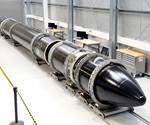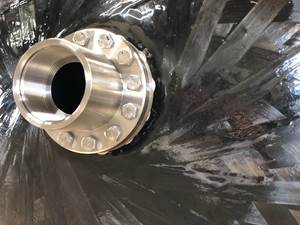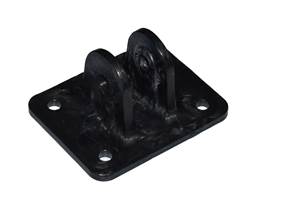Rocket Lab continues building access to space with latest launch vehicle missions
Successful execution of multiple customer missions with reusable composite Neutron and Electron rockets as well as new partnerships highlight Rocket Lab’s expertise.
Throughout May 2025, Rocket Lab USA Inc. (Long Beach, Calif., U.S.) has made numerous strides in scheduled rocket launches for customers and building partnerships. The end-to-end space company delivers launch services, spacecraft, satellite components and on-orbit management. Rocket Lab’s reusable launch vehicles — Neutron and Electron — as well as satellite bus structural panels and assemblies, primary structures, solar panel substrates and tanks are supported by flight-proven carbon fiber composites.
U.S. Air Force Research Laborary (AFRL). On May 8, Rocket Labs announced the launch of Neutron for the U.S. AFRL for a Rocket Cargo mission that is scheduled for a return-to-Earth launch no earlier than 2026.
The launch contract will see Neutron execute a Rocket Cargo survivability experiment under the AFRL Rocket Experimentation for Global Agile Logistics (REGAL) solicitation, an effort by the Department of Defense to create a rocket-based point-to-point transportation system to quickly and rapidly deliver cargo around the world with commercial launch providers. AFRL’s experiment will be launched by Neutron and re-enter Earth’s atmosphere, in a demonstration of re-entry capability for future REGAL missions.
NASA. The company was selected by NASA (Washington, D.C., U.S.) on May 14 to launch its Aspera mission, an astrophysics science mission designed to study the formation and evolution of galaxies and provide new insights into how the universe works.
Rocket Lab will launch the Aspera spacecraft on Electron from Rocket Lab Launch Complex 1 no earlier than Q1 2026. Through the use of a telescope to study ultraviolet light, Aspera will examine hot gas in the space between galaxies, called the intergalactic medium, that is thought to contribute to the birth of stars and planets. Aspera will be the first NASA astrophysics mission to gather and map these ultraviolet light signatures.
Aspera joins the list of NASA science missions awarded to Rocket Lab including the CAPSTONE mission launched to the Moon by Electron and operated by Rocket Lab’s Lunar Photon spacecraft; NASA’s hurricane monitoring TROPICS mission launched across two Electron launches in May 2023; the agency’s PREFIRE climate change-focused mission studying melting ice caps in the Antarctic; and other small satellite science and technology missions launched on Electron since 2018.
Institute for Q-shu Pioneers of Space Inc. (iQPS). On May 17, Rocket Labs launched its third mission with Japanese customer iQPS (Fukoaka). “The Sea God Sees” mission successfully launched on Electron from Rocket Lab Launch Complex 1 in Mahia, New Zealand, carrying iQPS’ QPS-SAR-10, a synthetic aperture radar (SAR) Earth-imaging satellite, to a 575-kilometer low Earth orbit, where it was deployed as part of iQPS’ growing constellation. The mission was launched just weeks’ after Rocket Lab’s previous launch for iQPS was deployed on March 15.
This mission in particular was the third overall launch for iQPS and the second in a multilaunch contract to launch eight missions for the company in 2025 and 2026. Four more launches are scheduled for launch in 2025, with the remaining two scheduled for 2026. Rocket Lab’s next mission for iQPS is scheduled to launch from no earlier than June 2025.
BlackSky. On May 22, Rocket Lab reported that its next scheduled mission for real-time space-based intelligence company BlackSky (Herndon, Va., U.S.) would cement Electron as the most prolific launcher for BlackSky’s constellation to date. The mission, “Full Stream Ahead,” is the second in a series of four Electron launches booked by BlackSky to deploy its Gen-3 satellites to orbit this year, and the 10th overall launch for the company.
The launch successfully took place on June 3 from Mahia, New Zealand, deploying the Gen-3 satellite to a 470-kilometer circular Earth orbit. It is the seventh Electron mission of 2025, its 65th launch overall and will bring the total number of satellites delivered to space by Rocket Lab to 226.
Related Content
Infinite Composites: Type V tanks for space, hydrogen, automotive and more
After a decade of proving its linerless, weight-saving composite tanks with NASA and more than 30 aerospace companies, this CryoSphere pioneer is scaling for growth in commercial space and sustainable transportation on Earth.
Read MoreHybrid process marries continuous, discontinuous composites design
9T Labs and Purdue applied Additive Fusion Technology to engineer a performance- and cost-competitive aircraft bin pin bracket made from compression-molded continuous and discontinuous CFRTP.
Read MorePlant tour: Teijin Carbon America Inc., Greenwood, S.C., U.S.
In 2018, Teijin broke ground on a facility that is reportedly the largest capacity carbon fiber line currently in existence. The line has been fully functional for nearly two years and has plenty of room for expansion.
Read MoreSulapac introduces Sulapac Flow 1.7 to replace PLA, ABS and PP in FDM, FGF
Available as filament and granules for extrusion, new wood composite matches properties yet is compostable, eliminates microplastics and reduces carbon footprint.
Read MoreRead Next
Rocket Lab Neutron rocket to support U.S. Space Force NSSL
Space rocket company to join $5.6 billion National Security Space Launch (NSSL) program, an opportunity to on-ramp its carbon fiber composite Neutron vehicle.
Read MoreNorthrop Grumman Series D investment advances MLV Eclipse co-developed with Firefly
A $50 million investment further supports Eclipse, a platform built upon the success of Firefly’s carbon fiber Alpha and Northrop Grumman’s Antares rocket with a leap in power, performance and payload capacity.
Read MoreRocket Lab all-composite Electron launch vehicle
New player scaling up two-stage rocket to relieve small-satellite launch backlog.
Read More



























